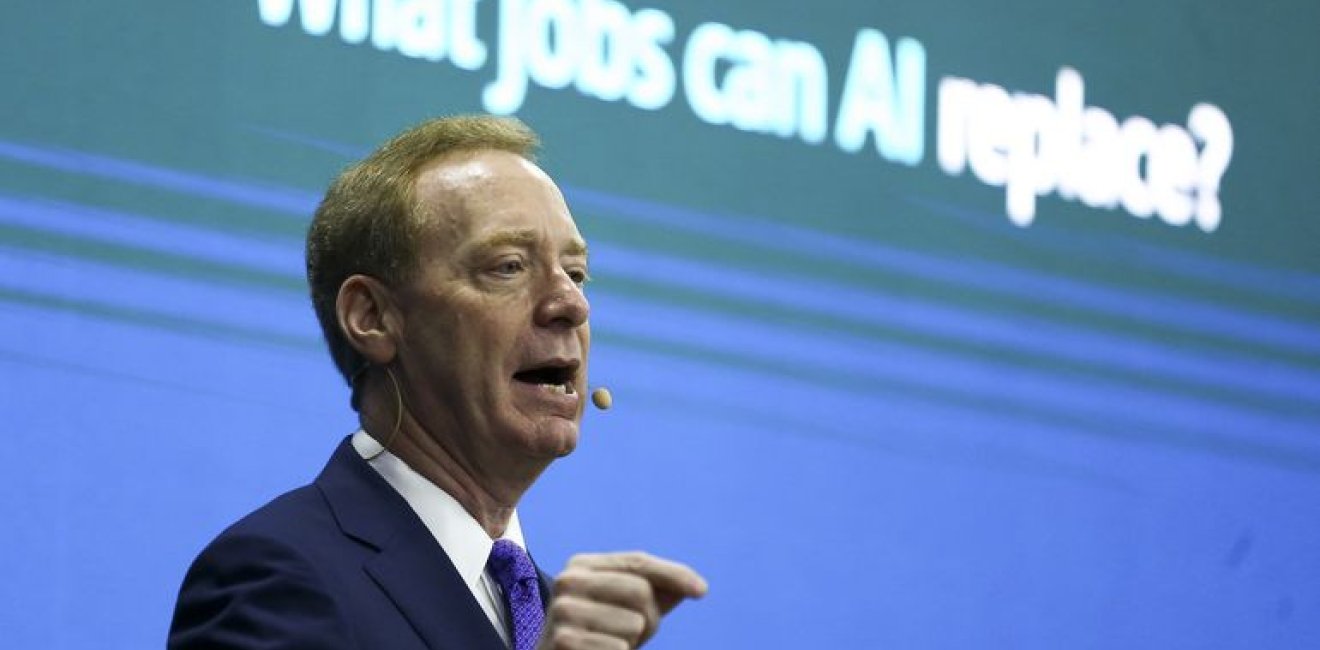AI Regulation Still Lagging In Brazil
A few days after ChatGPT was launched, a committee of experts presented the Senate with a comprehensive study on AI regulation for the country. But proposals haven't advanced in the Senate

A blog of the Brazil Institute
A few days after ChatGPT was launched, a committee of experts presented the Senate with a comprehensive study on AI regulation for the country. But proposals haven't advanced in the Senate

Since ChatGPT’s launch in November last year, it has become a global sensation (over 100 million users worldwide) and is fueling an arms race among tech companies in search of the next big artificial intelligence (AI) phenomenon.
In Brazil, authorities have begun quietly acting upon the AI boom. A Senate working group published a report in December, with recommendations on how Brazil should regulate AI. The 900-page text was produced by a group of legal experts, members of academia, companies, and Brazil's national data protection watchdog, ANPD. They worked under the leadership of Ricardo Villas Bôas Cueva, a member of Brazil's Superior Court of Justice — the country's second most senior judicial body.
"In the end, what this committee has produced is practically a library on the subject, which will facilitate discussions [about AI] beyond the bill’s approval," Bruno Bioni – founding director of Data Privacy Brasil, member of the ANPD council, and one of the experts responsible for the text – told The Brazilian Report.
This debate came after experts and politicians criticized an AI legal framework approved by the House last September. The bill was rushed through the floor with vague language, and some legal experts even considered it more of a "deregulation bill" than a legal framework.
The extensive text the commission presented to the Senate brings together several recommendations and outputs in a proposal with three main focal points: citizens' rights, the categorization of risks, and the governance measures and administrative sanctions that must be activated when the regulation is not adhered to.
The expectation is that people must be informed when they are interacting with artificial intelligence systems, be provided with an explanation of all decisions and recommendations the system provides, and have the right to contest provisions if they have legal consequences or significantly impact their interests.
In addition, people are entitled to "non-discrimination and correction of direct, indirect, illegal, or abusive discriminatory biases" and to the privacy and protection of their personal data under the “pertinent legislation.”
The second focus is on the definition of the degrees of risk that AI systems pose to Brazilian society. The examples that appear in this classification can be changed or expanded over time with the emergence of new technologies or new uses for them.
At the "high risk" level, 14 distinct purposes for AI were identified. Some examples are systems that offer access to and eligibility for essential private and public services, such as those that provide social assistance and security; that establish screening of candidates in decisions such as promotions or termination of employment contracts; and that are responsible for the safety and operation of critical infrastructure, such as water supply and electricity.
Biometric identification systems and autonomous vehicles also fall into this category.
At the “excessive risk” level, however, AI’s use is completely prohibited. The cases for which this degree of risk applies are, for example, the implementation of AI technology that exploits any vulnerabilities of specific groups and, when employed by the state, technologies that evaluate or rank citizens based on their social behavior through scoring for access to public services and policies. This type of social ranking is commonly used in China.
Moreover, the use of facial recognition and other biometric identification systems when used for public security also falls into this category. These systems will only be allowed when permitted by law or judicial authorization in cases of crimes in progress and searches for missing persons or victims of crime.
While in the last focus, companies and public bodies that use high-risk AI systems need to adopt governance measures that record the use of AI and come up with methods to correct possible biases.
In cases of non-compliance with the legislation, the foreseen administrative sanctions vary between warnings and fines of up to 2 percent of the company's revenue in less serious cases or fines of up to BRL 50 million (around USD 9 million) and the partial or total suspension of the system for more serious infractions.
Now that the report is ready, it will be presented to the Senate Constitution and Justice Committee and then go to the floor to be voted upon. As the bill should incorporate a large part of the articles presented by the jurists, after its approval, it must return to the House. Only when this step is complete will it pass for presidential sanction.
Even though the road seems long and painful, experts are still optimistic about the end result. Complex legal frameworks for matters such as AI take time to be approved. The Civil Rights Framework for the Internet, for example, was enacted in 2014, but the draft was completed back in 2010.
Moreover, specific regulations for this technology are still on the agenda of the European Union and the U.S., which intend to pass laws on the subject later this year. Most of the rules established on AI so far come from legislation passed between the countries of the Organization for Economic Cooperation and Development (OECD), or from already well-defined legal frameworks such as those of South Korea and Germany.
"But Brazil is following the world trend. So it can indeed take the lead in this discussion and be, why not, innovative regarding other countries," hopes Mr. Bioni.
"The scope of generative AI's impact on the economy is being unraveled. But we already know that the innovation power is a defining new force of international politics. The decisions made now might preserve our ability to invent, adopt, and adapt new technologies. Failure to do so may lead to unforeseen consequences that could hinder progress and innovation", states Bruna Santos, Brazil Institute Director.
A recent survey by Locomotiva, a pollster and market research company, found that Brazilians tend to be distrustful of AI. According to the study, which surveyed 1,700 people aged between 18 and 77, Brazilians tend to attribute grated intentionality and immorality to biases from AI systems (although experts blame it on human biases that AI is simply aping).
“It would be rash to say that these biases are intrinsically negative or positive. They probably reflect a history of bad experiences with technology, which can both reduce openness to the new and serve as a buffer against risks that we did not even foresee. One way or another, the fact is that Brazilians are suspicious,” explains Álvaro Machado Dias, a partner at Instituto Locomotiva who is a neuroscientist and a futurist.
The results in many ways echo findings from a 2018 Pew Research Center study. Brazil stands out as a country where fears of the nasty effects of AI and automation are significantly more prevalent among people aged 18 to 29, as opposed to older age groups. Data show a 17-percent gap between younger and older workers.
Data show that 83 percent of Brazilians believe automation will make it harder to find jobs, and 80 percent say inequality will grow.
“AI systems cannot and should not be demonized as they present benefits to society. However, we cannot romanticize them either. It depends on the context and the use cases. And our bill proposal understands what AI problems look like in the Brazilian context,” Data Privacy Brasil's Bruno Bioni comments.
Speaking to The Brazilian Report, Mariana Valente, associate director at InternetLab and another jurist responsible for the report, points out that technologies like ChatGPT highlight one more reason the topic needs to be discussed and regulated in the country.
Nevertheless, she says that it is important to remember that Brazil is already implementing some AI technologies in a way that impacts people's lives, such as in public policies and in education. “And this happens without the existence of specific rights and obligations associated with the use of these technologies," she says.
Issues of discrimination based on race and gender identity, which are structural problems in Brazil, could be exasperated with AI, especially with technologies that focus on facial recognition.
In 2019, for example, a black woman was arrested in Rio de Janeiro after her face was mistakenly identified by a smart camera installed in the Copacabana region during a pilot project. She was mistaken for a suspect who had already been serving a sentence since 2015. A study points out that false positives are more than just unwanted exceptions — and that 90 percent of arrests through facial recognition in Brazil affected black people.
The use of technology by the state for public safety remains in the plans of several public managers, mayors, and governors. The most recent case is that of SmartSampa, a project by the city of São Paulo that plans to install 20,000 cameras capable of identifying people based on “body structure” and monitoring social media.
Mayor Ricardo Nunes’s administration suspended its decree in December last year to correct concerns raised by civil society organizations. Racist terms such as "vagrancy" and "color" that were used to define the scope of the project were then withdrawn. Nevertheless, a preliminary report from São Paulo’s Audit Court still states that Smart Sampa violates citizen rights, especially of the black and LGBTQA+ population.
In the state of São Paulo, another project that foresees the installation of facial recognition cameras, this time on the subway lines, also received harsh criticism in 2022. Nevertheless, other subway lines should start receiving the equipment this year.
Like the content? Subscribe to the Brazilian Report using the discount code 100DAYS to get 20 percent off any annual plan.
Image Credit The Brazilian Report
Like the content? Subscribe to the Brazilian Report using the discount code 100DAYS to get 20 percent off any annual plan.

The Brazil Institute—the only country-specific policy institution focused on Brazil in Washington—aims to deepen understanding of Brazil’s complex landscape and strengthen relations between Brazilian and US institutions across all sectors. Read more


The Wilson Center’s prestigious Latin America Program provides non-partisan expertise to a broad community of decision makers in the United States and Latin America on critical policy issues facing the Hemisphere. The Program provides insightful and actionable research for policymakers, private sector leaders, journalists, and public intellectuals in the United States and Latin America. To bridge the gap between scholarship and policy action, it fosters new inquiry, sponsors high-level public and private meetings among multiple stakeholders, and explores policy options to improve outcomes for citizens throughout the Americas. Drawing on the Wilson Center’s strength as the nation’s key non-partisan policy forum, the Program serves as a trusted source of analysis and a vital point of contact between the worlds of scholarship and action. Read more



